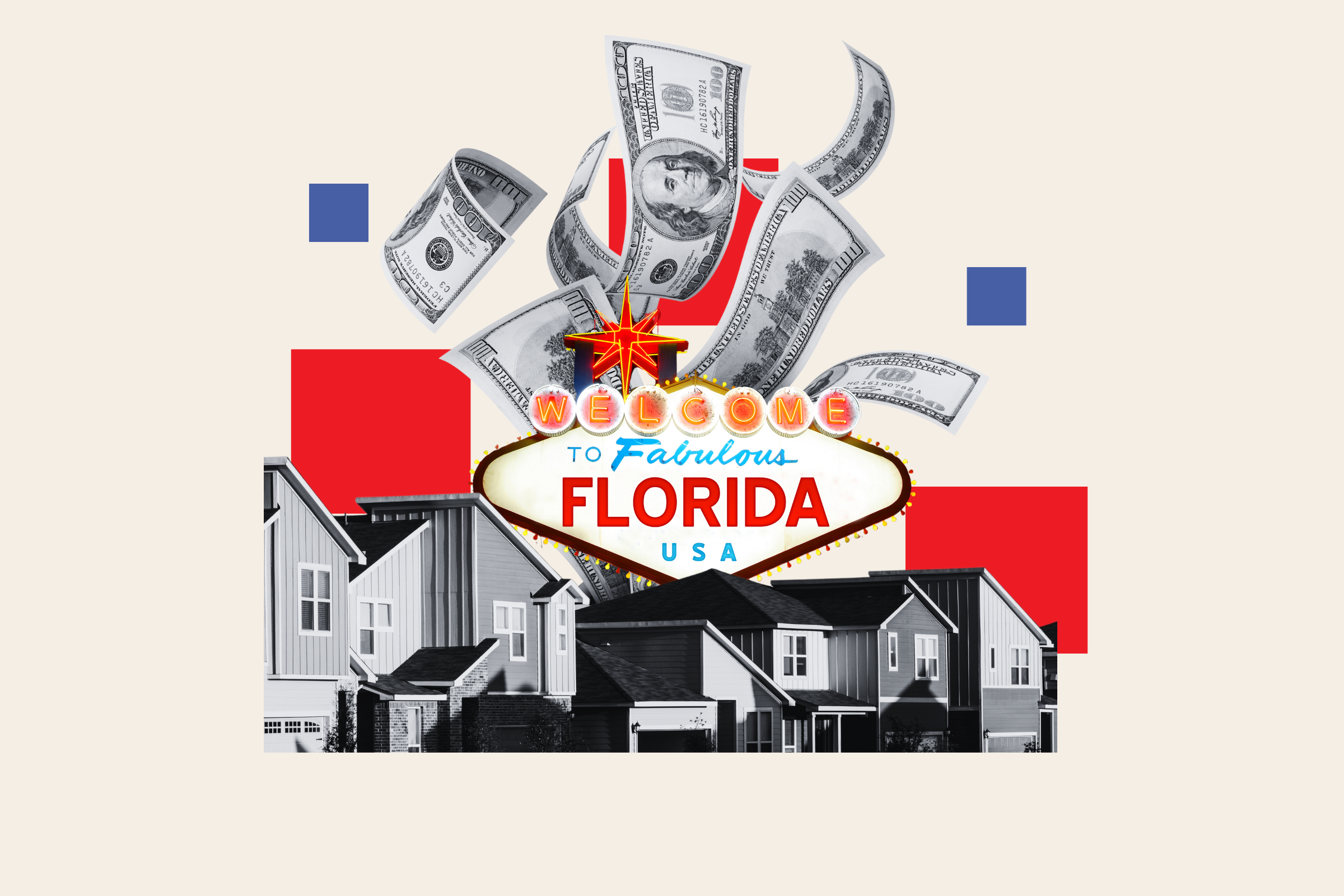Florida
Feeling sick after Christmas? Flu is spiking in Central Florida

If you’re one of the thousands in Central Florida who have come down with fevers, aches, coughs and headaches over the past few weeks, there’s a good chance it’s the flu.
Orange is one of six Florida counties experiencing an outbreak as emergency department visits soar statewide, according to state health department data. About 1,800 Floridians tested positive last week at AdventHealth CentraCare’s Central Florida network of urgent care centers, surpassing last year’s record for weekly cases, and the worst of Florida’s flu season may not be over, said Dr. Tim Hendrix, medical director for AdventHealth Centra Care.
“This is turning out to be worse than last year. And last year was the worst flu season I have seen in my history at CentraCare,” said Hendrix, who has worked for the urgent care network for over 20 years. “I was in the clinic last week and it was just flu, flu, flu.”
A combination of low vaccination rates, low immunity and active travel schedules may all be contributing to this year’s outbreak, said Jill Roberts, an associate professor at the University of South Florida College of Public Health.
“People vastly, vastly underestimate how dangerous flu is, and then you add to that the fallout of the vaccine hesitancy that came from COVID,” Roberts said.
Though most people with the flu recover within a few days to two weeks, some experience serious, life-threatening complications. Anyone can have a flu bout turn severe, but pregnant women, people over the age of 65, and children under 5 are at heightened risk, according to the U.S. Centers for Disease Control and Prevention.
Emergency warning signs include persistent chest or abdomen pain or pressure, a lack of urination, fever or cough that improves but then returns or worsens, severe muscle pain, and worsening of chronic medical conditions, according to the CDC. Any fever in a child under 12 weeks old warrants emergency attention.
Six kids have died of the flu in Florida this season. Three of them had an underlying medical condition that put them at higher risk, and three of them didn’t. None were vaccinated, according to the Florida Department of Health.
“Nearly every time there’s a pediatric death from influenza, the child is not vaccinated,” Roberts said.
About 31% of Florida kids 6 months to 18 years are vaccinated as of Dec. 9 compared to 43% nationally. Adult vaccination rates are only slightly better: 36% of Florida adults have been vaccinated compared to 42% nationwide, according to CDC data.
Of course, some people may get the shot and get sick anyway. Vaccination is not a guarantee that someone won’t catch the virus, but it will typically make the virus less severe.
“It’s a little bit late in the season, but it’s never too late to get vaccinated,” Roberts said.
Most adults need just one flu shot, which takes up to 2 weeks to take complete effect. Children aged 6 months to 8 years typically need two doses of flu vaccine administered at least four weeks apart during their first season of vaccination, according to the CDC.
Flu season typically continues long after the holidays are over in Florida. A peak often occurs in January or February.
For those who are about to pile into packed airports, paper masks also provide great protection against viruses like the flu, Roberts said.
Travelers also need to stay wary of other viruses. COVID-19 is seeing a small increase in Central Florida hospitals, though rates remain low according to the CDC. Respiratory syncytial virus (RSV) cases, which spiked in Florida in November, have died down.
Ccatherman@orlandosentinel.com; @CECatherman Twitter

Florida
Forward Depth Powering Panthers

Jesper Boqvist’s two goal game led the Florida Panthers to a 4-1 victory over the Utah Hockey Club. The win kept the team within four points of the Atlantic Division lead and it also put Boqvist one goal behind his career best at just the halfway point of the 2024-2025 campaign.
Boqvist’s performance continues a trend for the Panthers. Over the past few seasons, they’ve gotten the absolute most out of their depth forwards, with many of them posting their best offensive seasons while playing in Florida. In Boqvist’s first season with the Panthers, he’s the latest in the long line of bottom-six forwards powering the team to another playoff run.
Last year, it was center Kevin Stenlund. The fourth-line center plays a gritty and feisty game, but he found a scoring touch with the Cats during their Stanley Cup-winning campaign last year. Over 81 regular season games, he netted 11 goals and parlayed that into a new contract with the Utah Hockey Club.
Before that, it was Ryan Lomberg and Nick Cousins. During the 2022-2023 season, Lomberg reached new offensive heights and scored 12 goals in the regular season. Similarly, Cousins matched his best offensive campaign with nine goals and 27 points over 79 games.
Now, it’s Boqvist’s turn to be the breakout depth forward. He has some competition, however. 22-year-old Mackenzie Samoskevich, the team’s 2021 first-round pick, is getting his first full-time gig with the NHL club and looks like a fit. He has seven goals and 12 points through the first 37 games and will likely be the second bottom-six forward to score 10+ goals for the Panthers this season.
Either way, the trend continues in Florida. Their star power at the top of the lineup is on par with the best in the league and receives the majority of the attention from opposing teams and media. Understandly so, but their depth is what continues to power them towards a repeat of their Stanley Cup championship.
Make sure you bookmark Breakaway On SI for the latest news, exclusive interviews, recruiting coverage, and more!
Florida
Florida’s mortgage market is in trouble

Florida is one of the least affordable states in the country to buy a home, according to the latest data from the Mortgage Bankers Association, as high mortgage rates keep buyers out of the market.
Why It Matters
With its sunny weather, relaxed lifestyle, and relatively cheaper cost of living and housing, Florida attracted a flow of new residents during the COVID-19 pandemic. But those markets that boomed during the health emergency have experienced a rapid cooldown over the past year as inbound migration weakened and new inventory poured into the market.
The affordability strain caused by high mortgage rates and historically elevated prices, combined with the growth in inventory and skyrocketing homeowners insurance premiums, is likely to cause a cooldown in demand and a drop in prices across Florida, experts have said.
What To Know
The Mortgage Bankers Association uses the Purchase Applications Payment Index, also known as PAPI, to measure how affordable it is to buy a home in each state based on how much a mortgage plus interest on loans costs a household in relation to its income.
In November, Florida had a PAPI of 209.9, lower only than that of Nevada (248.7), Idaho (244.2) and Arizona (220.7). The national PAPI, for comparison, was 163.3 in the same month.
While Florida has one of the least affordable mortgage payments in the nation in relation to residents’ wages, the interest rates for a 30-year fixed mortgage in the state are slightly lower than at the national level, according to Bankrate data. As of Tuesday, the national average 30-year fixed mortgage rate was at 7.09 percent. In Florida, it was 7.06 percent.
Photo Illustration by Newsweek/Getty Images
How Are High Mortgage Rates Affecting the Florida Market
According to Nick Gerli, a real estate analyst and the CEO of Reventure App, the lack of affordability in Florida explains “the big market slowdown” in the state.
“Home sales are down 40 percent from their pandemic peak. Inventory is at the highest level in nearly 10 years. And now prices are starting to drop. But not fast enough for homebuyers,” he wrote on X, formerly Twitter, on Monday.
“Florida’s mortgage payment as a % of income is one of the highest in America at 40 percent,” Gerli wrote. “For the average buyer, they need to spend around $30,000 on mtg, tax, insurance. Median household income across the state is $75,000.”
What People Are Saying
Nick Gerli, the CEO of Reventure App, wrote on X: “Today’s 40 percent mtg payment/income ratio is unprecedented. The only other time it was close was the mid-2000s housing bubble. Before the big crash.”
The Senate Budget Committee wrote in a report published last month: “In certain communities, sky-high insurance premiums and unavailable coverage will make it nearly impossible for anyone who cannot buy a house in cash to get a mortgage and buy a home. Property values will eventually fall—just like in 2008—sending household wealth tumbling. The United States could be looking at a systemic shock to the economy similar to the financial crisis of 2008—if not greater.”
Sean O’Dowd, a real estate investor in Chicago, previously told Newsweek: “There’s not a single lender out there that I’m aware of that will give you a mortgage without proof of insurance. The problem is, if you have an insurance payment that’s just as much as the principal and interest payment for the mortgage, if you’ve got an insurance payment that’s five hundred bucks a month, you get to a situation where a homebuyer—especially a first-time homebuyer that doesn’t have a lot of capital to put down for the down payment—has such a weedy monthly payment with this huge insurance premium that they cannot afford to buy a house.”
What Happens Next
For Gerli, the combination of these factors—cooling demand, less inbound migration and growing supply—means the Florida market “is now turning.” His company is forecasting price declines across all of Florida’s housing market this year.
“These price declines will be welcome news to homebuyers, and finally start returning affordability to a housing market that sorely needs it,” he wrote.
Other experts agree that prices will drop in parts of Florida throughout 2025. Redfin economist Chen Zhao previously told Newsweek that the best places to buy a home this year will be “markets in the Sun Belt, especially Florida and Texas,” which are “the weakest at the moment.”
Norada Real Estate Investments also identified three metropolitan areas in Florida—Gainesville, Palm Bay-Melbourne-Titusville and Lakeland-Winter Haven—as at “very high risk” of experiencing a downturn this year, with prices potentially dropping by as much as 15 percent.
Florida
NHL to hold outdoor games in Florida next season, including 2026 Winter Classic

Hockey ice covered in thousands of stuffed toys during teddy bear toss
Hershey Bears fans threw a record 102,343 stuffed animals at their annual GIANT Teddy Bear Toss for charity.
Ice hockey may not evoke thoughts of beaches, sunshine and palm trees but that did not stop the NHL from announcing on Wednesday that, for the first time, it will hold outdoor games in Florida next season.
The Florida Panthers will host the New York Rangers in the Jan. 2 Winter Classic at the home of Major League Baseball’s Miami Marlins while the Tampa Bay Lightning will face the Boston Bruins in a Stadium Series game on Feb. 1, 2026 at the home of the NFL’s Tampa Bay Buccaneers.
The Panthers captured their first Stanley Cup championship in 2024 while the Lightning have won three championships in their history, including back-to-back titles in 2020 and 2021.
“Stanley Cups, strings of sellouts and the exponential growth of youth and high school hockey throughout the state have demonstrated that Florida is a hockey hotbed,” NHL Commissioner Gary Bettman said in a news release.
“Outdoor NHL games in the Sunshine State? Never let it be said that our league isn’t willing to accept a challenge.”
In the more than 30 years since the NHL expanded into Florida both franchises have enjoyed significant success, most recently with each of the last five Stanley Cup Final series featuring one of the Florida franchises.
Outdoor games have become a staple of the NHL’s regular season schedule with contests being staged in some of baseball’s and football’s most iconic stadiums.
The NHL has even held outdoor games in warm-weather climates before, notably Los Angeles, Dallas and Nashville.
The 2024-25 NHL season’s Winter Classic was held on Dec. 31 in Chicago while Columbus will host a Stadium Series game in March.
-

 Business1 week ago
Business1 week agoThese are the top 7 issues facing the struggling restaurant industry in 2025
-

 Culture1 week ago
Culture1 week agoThe 25 worst losses in college football history, including Baylor’s 2024 entry at Colorado
-

 Sports1 week ago
Sports1 week agoThe top out-of-contract players available as free transfers: Kimmich, De Bruyne, Van Dijk…
-

 Politics7 days ago
Politics7 days agoNew Orleans attacker had 'remote detonator' for explosives in French Quarter, Biden says
-

 Politics6 days ago
Politics6 days agoCarter's judicial picks reshaped the federal bench across the country
-

 Politics5 days ago
Politics5 days agoWho Are the Recipients of the Presidential Medal of Freedom?
-

 Health4 days ago
Health4 days agoOzempic ‘microdosing’ is the new weight-loss trend: Should you try it?
-

 World1 week ago
World1 week agoIvory Coast says French troops to leave country after decades
















